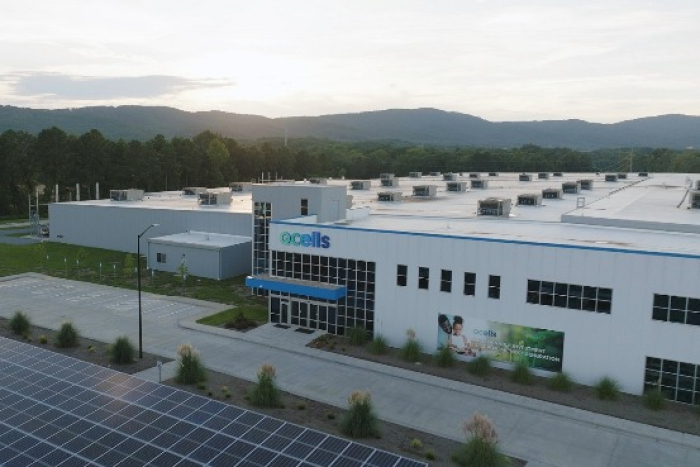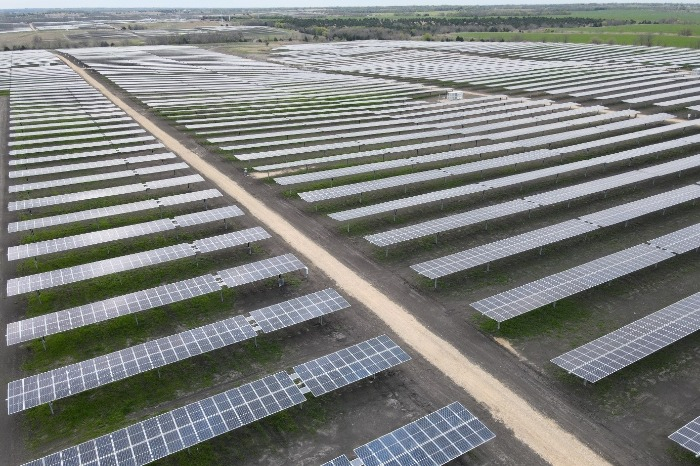Energy
Hanwha Q Cells expects windfall gain from Chinese rivals’ woes
Hanwha Q Cells is found to have abided by US tariff laws, dodged by Chinese solar panel makers in Southeast Asia
By Aug 21, 2023 (Gmt+09:00)
2
Min read
Most Read
LG Chem to sell water filter business to Glenwood PE for $692 million


Kyobo Life poised to buy Japan’s SBI Group-owned savings bank


KT&G eyes overseas M&A after rejecting activist fund's offer


StockX in merger talks with Naver’s online reseller Kream


Mirae Asset to be named Korea Post’s core real estate fund operator



Hanwha Q Cells Co., a solar power unit of South Korean conglomerate Hanwha Group, is expected to enjoy a windfall gain from the US government’s ruling that its Chinese rivals in Southeast Asian countries accounting for nearly 80% of US solar panel imports have circumvented the country’s trade laws.
On Friday, the US Commerce Department finally concluded that the operations of BYD Hong Kong, Canadian Solar, New East Solar, Trina and Vina Solar in Cambodia, Malaysia, Thailand and Vietnam skirted US tariff laws and should be slapped with additional import tariffs in the US.
They could face up to 254% retrospective import duties starting June next year.
The news has lifted the stock of Hanwha Solutions Corp., the parent of Hanwha Q Cells, on expectations that its solar panel-making unit would enjoy growing solar panel orders for its Malaysian and US operations on better price competitiveness.
Hanwha Solutions’ shares jumped 7.4% apiece to end at 37,750 won ($28.13) on Monday.
PVEL, an independent lab of the downstream solar industry, also noted a recent rise in test requests for solar modules made by Korean and Indian players.
US-CHINA ROWS CONTINUE
The US Commerce Department in March 2022 kicked off preliminary investigations on eight companies that manufacture solar panels and parts in Southeast Asia for possible violations of US trade laws.
The final ruling accuses five companies -- BYD Hong Kong, Canadian Solar, New East Solar, Trina and Vina Solar -- of finishing their solar panels with Chinese-sourced materials subject to US tariffs in Cambodia, Malaysia, Thailand and Vietnam to evade tariffs on Chinese-made goods.

Hanwha Q Cells was also under US scrutiny with Jinko and Boviet but the three were found to be in compliance with US trade laws, avoiding additional import duties.
Because the four Southeast Asian countries are responsible for nearly three-quarters of solar module imports to the US, the latest ruling is expected to raise the overall price of solar modules in the US.
Concerns about a sudden spike in solar module prices have prompted US solar power companies to protest the US government’s move to impose additional tariffs on those solar module imports from Southeast Asia.
Despite the US solar power industry’s opposition, Washington has maintained its hawkish stance on Chinese companies amid its ongoing trade rows with Beijing, a move expected to further widen the price gap between Chinese imports and their counterparts from non-Chinese companies.
As more solar power companies in the US will look for cheaper alternatives, Hanwha Q Cells is expected to take advantage of the latest decision, market analysts forecast.
Hanwha Q Cells claimed the largest share in the US residential solar module market with 33.7% last year, according to global market research firm Wood Mackenzie in May.
To appease US solar power companies, President Joe Biden waived the tariffs on solar panels last summer for a two-year period, meaning that solar module imports made with Chinese materials from Southeast Asia will be slapped with additional tariffs from June 2024.
Write to Hyung-Kyu Kim at khk@hankyung.com
Sookyung Seo edited this article.
More to Read
-

-
 EnergyHanwha Q Cells sweeps global solar energy industry awards
EnergyHanwha Q Cells sweeps global solar energy industry awardsJun 08, 2023 (Gmt+09:00)
1 Min read -
 EnergyHanwha Q Cells holds No.1 position in US solar module market
EnergyHanwha Q Cells holds No.1 position in US solar module marketMay 10, 2023 (Gmt+09:00)
1 Min read -
 EnergyKorea's Hanwha Q Cells halts litigation against Chinese module maker
EnergyKorea's Hanwha Q Cells halts litigation against Chinese module makerFeb 17, 2023 (Gmt+09:00)
1 Min read
Comment 0
LOG IN


